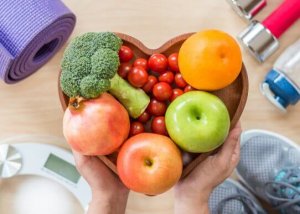Why it's Pointless to Train Hard If You Eat Poorly

In today’s society, we agree that approximately 70 percent of success in sports depends on diet. However, is diet really the key to results or is training hard? In this article, we’ll explain whether it’s better to train hard or to eat well.
Many people think that either exercising or following a diet can produce satisfactory results. However, in most cases, both aspects play important roles by complementing each other.
Every time we hear how diet represents a large part of fitness success, it’s said in a context in which many things are presupposed. We must keep in mind that these words are usually addressed to people who already train hard.
In other words, that phrase is directed to people who weight-lift and those who practice sports seriously. On the contrary, the phrase cannot be applied to sedentary people or those who only practice sports from time to time.
The other assumption that surrounds exercise is that not everyone who trains will train hard. It’s mostly directed to people who don’t perform intense or high-quality workouts. Keep reading to find out the reality of this controversial topic.
If you don’t train hard, you won’t see results
There’s no doubt that diet is a fundamental factor when it comes to the world of fitness. However, this is only true as long as high-quality training is carried out.
For example, if a person does not train adequately when it comes to the quality, duration, and intensity of their workouts, they will not have positive results. This is on a muscular level even if they adhere to a strict diet.

However, if the person’s goal is simply to lose weight or to maintain their current weight, a diet can be a great way to achieve those goals. Since those are not the goals of most people, it’s important to know that without quality exercise, there will be no positive results.
Training hard on a bad diet
Let’s analyze another scenario: what happens if a person performs intense and high-quality exercises while following a poor diet?
Training hard is closely related to an individual’s diet. If a diet is rich in nutrients such as proteins and macro-nutrients, there will be a caloric abundance which will lead to an increase in muscle mass and strength.
However, even if a healthy diet is maintained, without exercise you won’t achieve your fitness goals.
If a person maintains a diet poor in proteins, their muscles will not be able to regenerate properly after workouts. They will only achieve poor to no gains, therefore their goals will not be met. No matter how hard they train.
Planning is the key to success
If you have any doubts about what sort of diet is right for you according to your exercise regime, consult your specialist or trainer for help. This will help you achieve your goals.
In conclusion, we can confirm that diet is key when it comes to seeing results. However, we must also keep in mind that diet by itself cannot achieve certain goals without the implementation of hard work and quality training.

That’s why instead of agreeing that diet forms 70 percent of fitness success, it’s better to say that with a balanced diet and hard work, you’ll achieve great results.
In today’s society, we agree that approximately 70 percent of success in sports depends on diet. However, is diet really the key to results or is training hard? In this article, we’ll explain whether it’s better to train hard or to eat well.
Many people think that either exercising or following a diet can produce satisfactory results. However, in most cases, both aspects play important roles by complementing each other.
Every time we hear how diet represents a large part of fitness success, it’s said in a context in which many things are presupposed. We must keep in mind that these words are usually addressed to people who already train hard.
In other words, that phrase is directed to people who weight-lift and those who practice sports seriously. On the contrary, the phrase cannot be applied to sedentary people or those who only practice sports from time to time.
The other assumption that surrounds exercise is that not everyone who trains will train hard. It’s mostly directed to people who don’t perform intense or high-quality workouts. Keep reading to find out the reality of this controversial topic.
If you don’t train hard, you won’t see results
There’s no doubt that diet is a fundamental factor when it comes to the world of fitness. However, this is only true as long as high-quality training is carried out.
For example, if a person does not train adequately when it comes to the quality, duration, and intensity of their workouts, they will not have positive results. This is on a muscular level even if they adhere to a strict diet.

However, if the person’s goal is simply to lose weight or to maintain their current weight, a diet can be a great way to achieve those goals. Since those are not the goals of most people, it’s important to know that without quality exercise, there will be no positive results.
Training hard on a bad diet
Let’s analyze another scenario: what happens if a person performs intense and high-quality exercises while following a poor diet?
Training hard is closely related to an individual’s diet. If a diet is rich in nutrients such as proteins and macro-nutrients, there will be a caloric abundance which will lead to an increase in muscle mass and strength.
However, even if a healthy diet is maintained, without exercise you won’t achieve your fitness goals.
If a person maintains a diet poor in proteins, their muscles will not be able to regenerate properly after workouts. They will only achieve poor to no gains, therefore their goals will not be met. No matter how hard they train.
Planning is the key to success
If you have any doubts about what sort of diet is right for you according to your exercise regime, consult your specialist or trainer for help. This will help you achieve your goals.
In conclusion, we can confirm that diet is key when it comes to seeing results. However, we must also keep in mind that diet by itself cannot achieve certain goals without the implementation of hard work and quality training.

That’s why instead of agreeing that diet forms 70 percent of fitness success, it’s better to say that with a balanced diet and hard work, you’ll achieve great results.
All cited sources were thoroughly reviewed by our team to ensure their quality, reliability, currency, and validity. The bibliography of this article was considered reliable and of academic or scientific accuracy.
- OMS. (2012). OMS | Alimentación sana. Alimentacion Sana. https://doi.org/10.3746/jkfn.2014.43.11.1642
- del Castillo, V. (1995). La alimentacion del deportista. In Salud, Ejercicio Físico y Deporte(pp. 5–8). Retrieved from http://www.federemoycanotaje.org/media/9404/la alimentación del deportista.pdf
This text is provided for informational purposes only and does not replace consultation with a professional. If in doubt, consult your specialist.








